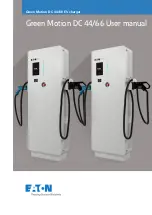
Chapter 1
Important Safety Instructions
This document contains important safety and operating instructions. Please read these instructions
carefully and save them for future reference.
Before using the battery charger, read all the instructions and cautionary markings on the charger, the
battery, and the radio using the battery.
WARNING:
• To reduce the risk of damage to the power cord, pull the plug rather than the cord when
disconnecting power cord from the AC outlet or the charger.
• To reduce the risk of fire or electric shock, avoid using an extension cord. If an extension cord must
be used, ensure that the cord size is 18 AWG for lengths of up to 6.5 feet (2 m), and 16 AWG for
lengths up to 9.8 feet (3 m).
• To reduce the risk of fire, electric shock, or injury, do not operate the charger if it is broken or
damaged in any way. Take it to a qualified Motorola Solutions service representative.
• To reduce the risk of fire or electric shock, do not disassemble the charger. It is not repairable and
replacement parts are not available.
• To reduce the risk of electric shock, unplug the charger power adapter from the AC outlet before
attempting any maintenance or cleaning.
• To reduce the risk of injury, charge only the rechargeable authorized batteries. Other batteries may
explode, causing personal injury and damage.
• To reduce the risk of fire, electric shock, or injury, only use the accessories recommended by
Motorola Solutions.
• Changes or modifications made to this device, not expressly approved by Motorola Solutions, could
void the authority of the user to operate this equipment.
1.1
Class B Digital Device
NOTE:
This equipment has been tested and found to comply with the limits for a Class B digital
device, pursuant to part 15 of the FCC Rules. These limits are designed to provide reasonable
protection against harmful interference in a residential installation. This equipment generates,
uses and can radiate radio frequency energy and, if not installed and used in accordance with
the instructions, may cause harmful interference to radio communications. However, there is
no guarantee that interference will not occur in a particular installation. If this equipment does
cause harmful interference to radio or television reception, which can be determined by turning
the equipment off and on, the user is encouraged to try to correct the interference by one or
more of the following measures:
• Reorient or relocate the receiving antenna.
• Increase the separation between the equipment and receiver.
• Connect the equipment into an outlet on a circuit different from that to which the receiver is
connected.
• Consult the dealer or an experienced radio/TV technician for help.
MN007272A01-AA
Chapter 1 : Important Safety Instructions
6



































